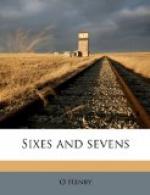And then came another wonder. In the gallery overhead the sacks of flour were stacked in long rows. Perhaps a mouse had been at one of them; anyway the jar of the deep organ note shook down between the cracks of the gallery floor a stream of flour, covering Father Abram from head to foot with the white dust. And then the old miller stepped into the aisle, and waved his arms and began to sing the miller’s song:
“The wheel goes round,
The grist is ground,
The dusty
miller’s merry.”
—and then the rest of the miracle happened. Miss Chester was leaning forward from her pew, as pale as the flour itself, her wide-open eyes staring at Father Abram like one in a waking dream. When he began the song she stretched out her arms to him; her lips moved; she called to him in dreamy tones: “Da-da, come take Dums home!”
Miss Phoebe released the low key of the organ. But her work had been well done. The note that she struck had beaten down the doors of a closed memory; and Father Abram held his lost Aglaia close in his arms.
When you visit Lakelands they will tell you more of this story. They will tell you how the lines of it were afterward traced, and the history of the miller’s daughter revealed after the gipsy wanderers had stolen her on that September day, attracted by her childish beauty. But you should wait until you sit comfortably on the shaded porch of the Eagle House, and then you can have the story at your ease. It seems best that our part of it should close while Miss Phoebe’s deep bass note was yet reverberating softly.
And yet, to my mind, the finest thing of it all happened while Father Abram and his daughter were walking back to the Eagle House in the long twilight, almost too glad to speak.
“Father,” she said, somewhat timidly and doubtfully, “have you a great deal of money?”
“A great deal?” said the miller. “Well, that depends. There is plenty unless you want to buy the moon or something equally expensive.”
“Would it cost very, very much,” asked Aglaia, who had always counted her dimes so carefully, “to send a telegram to Atlanta?”
“Ah,” said Father Abram, with a little sigh, “I see. You want to ask Ralph to come.”
Aglaia looked up at him with a tender smile.
“I want to ask him to wait,” she said. “I have just found my father, and I want it to be just we two for a while. I want to tell him he will have to wait.”
XVII
NEW YORK BY CAMP FIRE LIGHT
Away out in the Creek Nation we learned things about New York.
We were on a hunting trip, and were camped one night on the bank of a little stream. Bud Kingsbury was our skilled hunter and guide, and it was from his lips that we had explanations of Manhattan and the queer folks that inhabit it. Bud had once spent a month in the metropolis, and a week or two at other times, and he was pleased to discourse to us of what he had seen.




